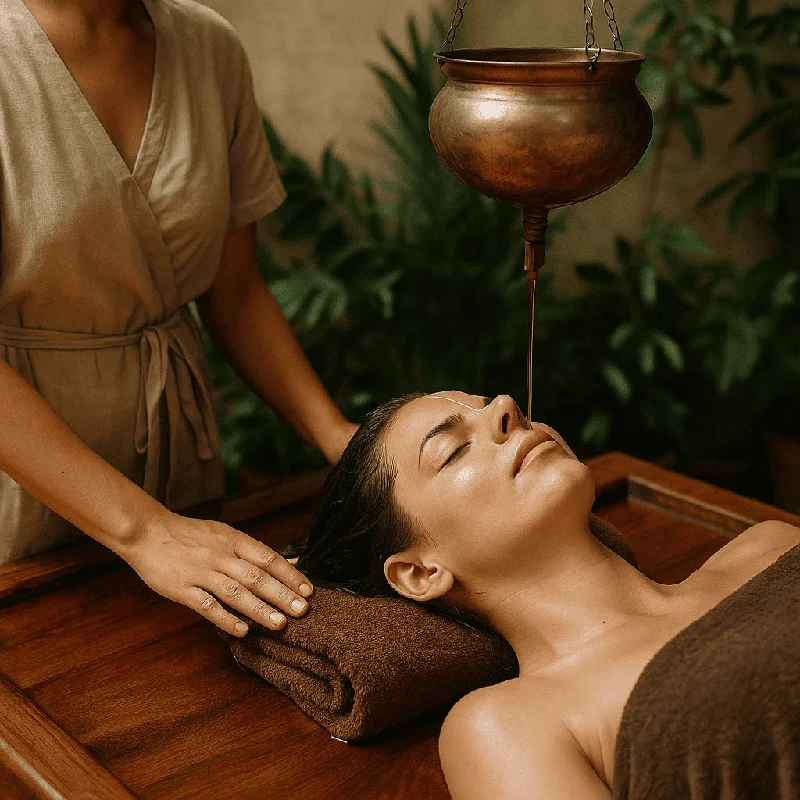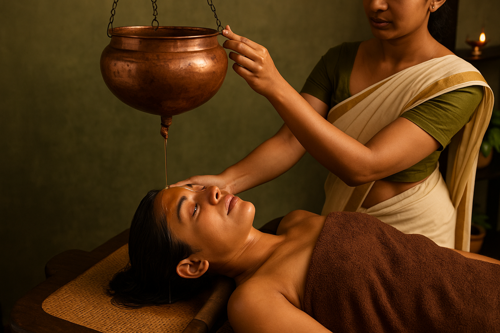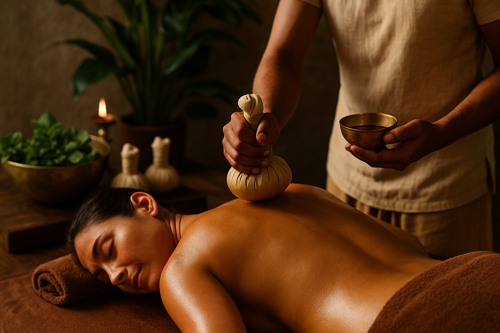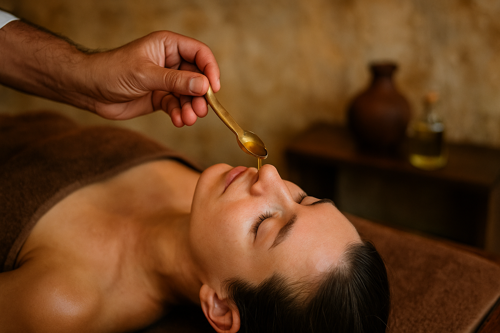Ask Ayurvedic doctor a question and get a consultation online on the problem of your concern in a free or paid mode. More than 2,000 experienced doctors work and wait for your questions on our site and help users to solve their health problems every day.
Panchakarma for Stress Relief: Ayurvedic Therapy for Emotional Healing

Stress — it sneaks up on you, doesn’t it? One minute you’re managing fine, and the next, life feels like it’s pressing down from every angle. Deadlines, family tensions, a never-ending to-do list... modern life demands more from our minds and bodies than they were ever designed to handle. So where does Ayurveda fit into all this? And more specifically, what is the deal with Panchakarma therapy and emotional healing?
Before we dive deep, here’s the short of it: Panchakarma is an ancient, thorough form of detox therapy in Ayurveda, meant to not just cleanse the body but also untangle the knots stress creates in the mind. This isn’t just a spa day in disguise. We’re talking about a natural stress relief system that has been fine-tuned over thousands of years. If you’ve ever thought about hitting the reset button on your life — really resetting, not just a weekend off — Panchakarma for stress might be what you're looking for.
Now, let's explore how exactly Panchakarma addresses the chaos inside.

How Panchakarma Supports Stress Relief
The Ayurvedic View on Stress and Energy Imbalance
In Ayurveda, stress isn’t just a "mental thing." It’s an energetic disturbance — a sign that your doshas (body energies) have slipped out of harmony. Usually, it's Vata that goes haywire when we’re stressed: think racing thoughts, anxiety, insomnia. But really, any dosha imbalance can show up when life gets heavy.
According to the ancient texts, stress creates "ama" — toxic buildup — not just physically, but emotionally too. It's sticky, clouding your thoughts, judgment, and even your intuition. The worse the ama, the harder it becomes to connect with yourself.
Here’s where Panchakarma Ayurvedic treatment steps in: by removing deep-seated toxins and stabilizing the energy body, it clears space. Real space. The kind of breathing room you don’t even realize you’re desperate for until you feel it again.
Funny thing: when I went through my first Panchakarma, I thought it would just be oils and massages. I wasn’t prepared for the emotional ride. Halfway through the program, I found myself crying for no reason one morning — but not in a bad way. More like years of bottled-up tension finally melting away.
Emotional Detox Through Panchakarma
Let’s be honest: most of us don’t just need a break. We need a full emotional detox. That’s exactly what Panchakarma offers.
Think of your mind like a closet stuffed with old clothes you never wear but can’t seem to throw out. Panchakarma therapy helps you clear it all out — the outdated worries, the buried fears, the emotional junk that clutters your mental space.
Therapies like Shirodhara for stress, where warm oil pours steadily over your forehead (the “third eye” area), create an almost meditative, hypnotic stillness. It’s like someone presses "pause" on the endless inner chatter. Even the skeptics I know — the ones who side-eye anything remotely "woo-woo" — end up admitting how real the calm feels after a Shirodhara session.
And it’s not just about feeling better temporarily. Ayurvedic stress treatments aim to rewire your nervous system, to rebuild resilience, not just patch you up for another round of the daily grind.

The Role of Detox Therapy in Mental Clarity
Alright, let's dig a little deeper. You know that foggy, brain-soup feeling you get after a stressful week? Ayurveda has a name for it: mental ama. Yep, stress creates actual "gunk" in your mind, not just your body. This isn’t just poetic talk — it's a way of understanding why we feel so sluggish, confused, and emotionally stuck when we’re overwhelmed.
Detox therapy in Ayurveda isn’t only about cleaning out your liver or gut (although that’s part of it too). It’s about cleansing your emotional pathways. Clearing space so clarity, peace, and vitality can naturally re-emerge.
I remember a friend, Maya, who struggled with low-grade anxiety for years. Not full-blown panic attacks, but this constant undercurrent of dread. She tried meditation apps, journaling, even the "digital detox" weekends. They helped... a little. But nothing really shifted until she did a proper Panchakarma program. Afterward? She described it as finally stepping out of the fog.
How Stress Toxins (Mental Ama) Affect Your System
When mental ama builds up, it's like trying to drive with a windshield smeared in mud. Your decisions get clouded. Your emotions get reactive. Your relationships start to suffer — because you’re operating from a place of distortion.
In Ayurveda, it’s believed that these subtle toxins lodge themselves into the deeper tissues — including the mind tissue, known as "manas dhatu." If left unchecked, they fester into more serious emotional disorders: chronic anxiety, depression, burnout, even spiritual disconnection.
And honestly, we’ve all been there. You know that feeling when you’re “fine” on paper — you’re sleeping, eating, working — but something inside just feels wrong? That’s ama doing its dirty work behind the scenes.
Panchakarma for stress isn’t just about prevention. It’s about reversing that gunk. It’s about giving your system the tools it needs to self-heal.
Panchakarma Therapies That Calm the Nervous System
Now, let’s get practical. What exactly happens during panchakarma therapy that makes it such a powerhouse for emotional healing?
Here are a few key therapies you’ll often experience:
-
Abhyanga (oil massage): Warm medicated oils seep into your skin, calming frayed nerves almost instantly. It’s grounding, deeply nurturing, and strangely emotional sometimes. I’ve seen people tear up mid-massage — and that's a good thing.
-
Shirodhara for stress: Like I mentioned before — it’s warm oil poured steadily over your forehead. I swear, it feels like the universe is cradling your head. If you have racing thoughts, this is pure magic.
-
Swedana (herbal steam): Opens up channels, melts away stiffness, and encourages the release of emotional tension locked in your muscles.
-
Nasya (nasal therapy): This one’s weird but amazing. Herbal oils are administered through the nose to clear the mind and uplift the senses. Perfect for anyone whose stress shows up as tension headaches or emotional heaviness.
And a good Panchakarma isn’t just about the therapies themselves. It’s the whole ritual — the slow, mindful pace, the careful preparation and aftercare, the deep respect for the body’s wisdom.
Honestly, half the healing comes from allowing yourself to finally stop rushing.
Key Stress-Relieving Therapies in Panchakarma
Abhyanga, Shirodhara, Swedana (Steam), and Nasya
Let’s take a closer look at these therapies, because honestly, they deserve more than just a passing mention. When we talk about panchakarma ayurvedic treatment for stress, these four therapies are the MVPs.
Abhyanga is like someone giving your nervous system a hug. Two practitioners often work together, synchronizing their movements in a choreographed rhythm that feels strangely like you’re floating. It’s not just relaxation — it’s about realigning your energy fields, grounding your mind back into your body.
Shirodhara... well, if I had to pick just one therapy for pure mental bliss, this would be it. It’s hypnotic. There’s something about that steady, warm stream that drowns out the mind’s chaos. After my first Shirodhara, I felt like I could actually hear myself think — but the thoughts were quieter, kinder.
Swedana, the herbal steam, is sneaky. You go in thinking, “Okay, this will just make me sweat.” But the magic is deeper: it loosens deep-seated emotional residues. I once cried after a steam bath, and I didn’t even know why. It was like years of tension were evaporating with the steam.
Nasya was the hardest for me at first — having oils dripped into your nose isn’t exactly a spa fantasy. But wow, the mental clarity after? It's like someone turned on a light in a dusty attic.
Create a Peaceful Ritual: Preparation, Treatment, Integration
Here’s something important most people miss: Panchakarma isn’t just about the therapies.
It’s about creating a ritual out of healing.
Preparation involves eating lighter foods, maybe doing some mild self-oiling and herbal treatments. This gets your body ready to release toxins.
Treatment is the heart of the journey — the massages, the steam, the purgation therapies (yep, you’ll probably have to poop out some toxins too — Ayurveda keeps it real).
Integration is just as vital. It's the slow re-entry into daily life. Gentle diet. Rest. Lots of journaling, reflecting, and not rushing back to "normal."
If you skip the prep or integration, honestly, you’re robbing yourself of the full transformation. Trust me. I learned the hard way.

Panchakarma vs Modern Stress Relief
Why Holistic Treatments Work Where Quick Fixes Fail
Look — there are tons of quick fixes for stress: a night out, a few drinks, a Netflix binge.
And they work... for a few hours.
But panchakarma benefits for mind are deeper because it addresses the root. It acknowledges that stress isn’t just in your head. It’s in your gut, your joints, your muscles, your sleep patterns — your whole system.
Modern life treats symptoms. Ayurveda treats the source.
Evidence and Expert Insights on Ayurvedic Mental Healing
Skeptical? Good. Healthy skepticism means you’re thinking critically.
The thing is, growing research now backs up what Ayurveda has known forever. Studies show therapies like Shirodhara for stress can reduce cortisol levels, balance brain wave patterns, and even regulate blood pressure.
Organizations like the
Is Panchakarma Right for Your Mind-Body Balance?
Short answer: it depends.
If you’re mildly stressed, a lighter detox might be enough. But if you feel like stress has become part of your identity — like you don’t even remember what “relaxed” feels like — then a full panchakarma ayurvedic treatment could be life-changing.
But go in with the right mindset: this isn’t passive. It’s participatory. Healing asks something of you.
Conclusion
Stress may be inevitable, but drowning in it isn’t. Ayurveda and Panchakarma offer more than symptom relief — they offer holistic stress relief. A true reboot for your nervous system, emotions, and even your soul.
If you’re feeling the pull, maybe it’s time to honor that. Maybe it’s time to detox more than just your body — maybe your heart needs a cleanse too.
FAQs
What are the best therapies in Panchakarma for mental well-being?
Shirodhara, Abhyanga, and Nasya are top-tier for clearing mental ama and restoring emotional balance.
Can Panchakarma help with anxiety or burnout?
Absolutely. In fact, Panchakarma is specifically designed to address the systemic imbalances that contribute to anxiety and emotional exhaustion.
How soon can I feel results after a Panchakarma stress treatment?
Some feel lighter and clearer immediately; others notice gradual shifts over weeks. True integration can take time — and that’s okay.
Are there any risks or contraindications for mental detox?
If you’re dealing with acute mental illness, it’s crucial to work with both Ayurvedic and conventional healthcare providers. Panchakarma is powerful — but it’s not a replacement for psychiatric care when needed.
References
-
National Ayurvedic Medical Association -
Ayurveda Association of Canada -
Ayurvedic Institute

